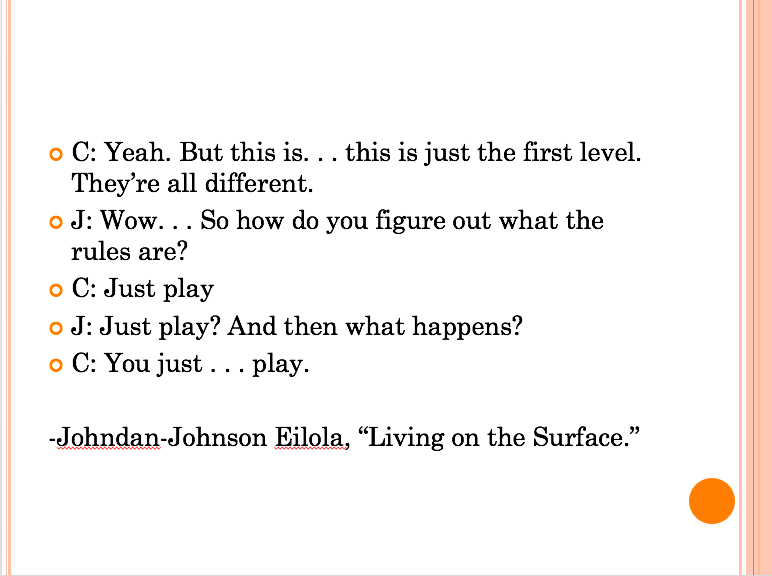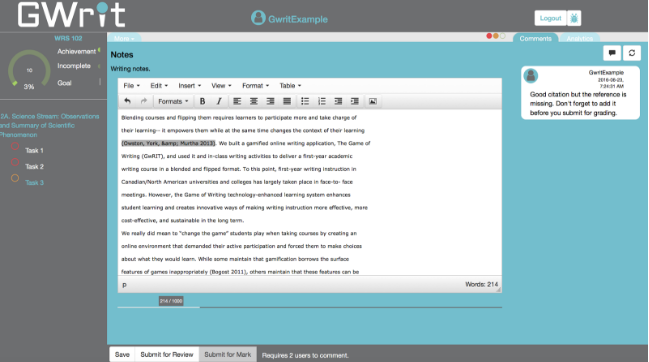Presenters
Brett Keegan, Syracuse University
Nina Feng, University of Utah
Roger Graves, University of Alberta
Heather Graves, University of Alberta
Geoffrey Rockwell, University of Alberta
Review
In the panel “Games, Play, and Design,” each of the presenters approached game integration into the composition classroom from different institutional contexts and theoretical perspectives. Yet, what tied these presentations together was the thoughtful level of research and discussion that explored how we, as instructors, may move beyond approaching games in the classroom as a single activity or even a more casual theme, toward creating games that encompass the goals of a particular course and the writing that takes place there.
Brett Keegan’s talk “Tinkering with (Inter)textuality” connected understandings of rhetoric to play by pulling from game theory, rhetorical discussion on design and invention, and scholarship on genre. Keegan describes how genre and games are aligned since they both require a procedural rhetoric—or some set of implicit rules—that develop and change through circulation.

In the next presentation “Deep Gamification World Making in First-Year Writing,” Nina Feng described how she turned her first-year writing course into a game world as a response to Gee and Giroux’s critiques of standardized education. During the talk, Feng acknowledges some of the tension and debate around the term “gamification,” stating, “I hate this term…but it is useful.” Gamification, for Feng, is more about games than it is play, since it emphasizes the use of game design elements in non-game contexts. On the other hand, games that include the integration of play allow for freedom and for the “players” to make choices.
Whereas much past game design for education has been problematic and shallow since it has focused on features of a game—such as points, leaderboards, and badges—there have been less strives to make pedagogical environments that employ the deep features of a game that embrace play, wonder, and narrative possibilities.
In her own pedagogy, Feng took advantage of the affordances of games’ deep features by developing her first-year writing class as a sci-fi game space called “The Empathy Trials.” The features of “The Empathy Trials” are complex and go far beyond the simple integration of badge or point systems: for example, Feng performs as the planet’s leader by creating pre-recorded video narratives and even leaves clues under students’ desks to add to the narrative of the game experience.

In the final presentation Roger Graves and Heather Graves described The Game of Writing, a software program developed specifically for the composition classroom at the University of Alberta. The Game of Writing automates gamification systems often used in classrooms, such as goal achievement, recognition through badges, and statistical feedback. The software also uses social networking theory to encourage commenting and feedback to students from other students, from the instructor, from writing tutors, and from graduate teaching assistants.
[Minutes 47-52 of this video from CCCC 2015 in Tampa, Florida offers another glimpse of “The Game of Writing”]As opposed to a course learning management system or a competitive game, “The Game of Writing” is a composing system, where the primary goal is collaborating and emphasizing a writing feedback cycle.

Collectively, these three presentations on games, play, and design speak to the degree that games and gaming conventions are transforming not only how we teach, but also what we value when we teach writing. They also speak to very different versions of what a composition future that more fully embraces games and gamification may look like.
(As of 2/2/2018 the Storify has been archived below.)
Archived Storify post:
Feng points out that in designing course that takes up "deep gamification," we must make space for student choice, play #WatsCon16 #d11
— Chase Bollig (@ChaseBollig) October 21, 2016
@b_keegan uses Lynda Barry's Syllabus as examples of playing w/ genre https://t.co/Q42i81qUvu #WatsCon16 #D11
— Kristin (@kristin_ravel) October 21, 2016
@rogergraves and Heather Graves note value of social-media style interface for hybrid online course #WatsCon16 #d11
— Chase Bollig (@ChaseBollig) October 21, 2016
Heather Graves and @rogergraves invite us to consider the ways that gamification allows composition to scale up #WatsCon16 #d11
— Chase Bollig (@ChaseBollig) October 21, 2016
https://twitter.com/b_keegan/status/789490357427929088
Feng's future course design will bring together game studies, world-making, and community-engaged learning #WatsCon16 #d11
— Chase Bollig (@ChaseBollig) October 21, 2016
#watscon16 #d11 Low stakes writing, collaborative projects, plus emergent narratives = motivated students
— Roger Graves (@rogergraves) October 21, 2016
Through Feng's worldmaking, she encourages students to question the gatekeepers who manage knowledge #WatsCon16 #d11
— Chase Bollig (@ChaseBollig) October 21, 2016
#watscon16 #d11 Feng: setting up a virtual world (via an overarching narrative plus periodic "cut scenes/videos"
— Roger Graves (@rogergraves) October 21, 2016
#WatsCon16 #d11 Feng: Need to aim for collaborative rather than competitive games (competitive games implement points, etc)
— Roger Graves (@rogergraves) October 21, 2016
#WatsCon16 #d11 shallow gamification (points, leaderboards) not tied to learning goals is problematic: need to tie in to student goals
— Roger Graves (@rogergraves) October 21, 2016
Gamification fails to capture the complexity of game play and offers shallow vs deep or structural vs content gamification #WatsCon16 #d11
— Chase Bollig (@ChaseBollig) October 21, 2016
Feng points out the limitations of gamification in education, particularly the use of points, badges, and levels #WatsCon16 #d11
— Chase Bollig (@ChaseBollig) October 21, 2016
Feng offers "play" as a form of subversion #WatsCon16 #d11
— Chase Bollig (@ChaseBollig) October 21, 2016
Feng cites Gee's critique of individualized knowledge-production, positing world-making & gaming as an alternative pedagogy #WatsCon16 #d11
— Chase Bollig (@ChaseBollig) October 21, 2016
"Just play" approach in the composition classroom demystifies some of the conventions of genre – @b_keegan #WatsCon16 #d11
— Chase Bollig (@ChaseBollig) October 21, 2016
games demonstrate genre functions, including play within constraints, and prioaretic possibilities, says @b_keegan #WatsCon16 #d11
— Chase Bollig (@ChaseBollig) October 21, 2016
in games, the act of invention often extends beyond the designer as players move through the game world @b_keegan #WatsCon16 #d11
— Chase Bollig (@ChaseBollig) October 21, 2016
the specter of the rhetorical situation persists when viewing games from the perspective of the player – @b_keegan #WatsCon16 #d11
— Chase Bollig (@ChaseBollig) October 21, 2016
https://twitter.com/DrCCedillo/status/789483831627833344
@b_keegan opens his presentation and the panel on game studies with definitions of paida, ludus, and procedural rhetoric #WatsCon16 #d11
— Chase Bollig (@ChaseBollig) October 21, 2016
excited a panel on game studies. Looking forward to a composition grounding games in the classroom #WatsCon16 #d11
— Chase Bollig (@ChaseBollig) October 21, 2016
